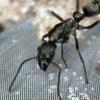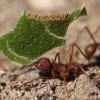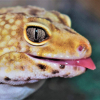- Formiculture.com
- Forums
- Gallery
- Members
- Member Map
- Chat

Camponotus Nanitic Death, Odd behaviors?
Started By
Derek451
, Jul 16 2019 4:01 PM
camponotus maritimus nanitic death behavior
15 replies to this topic
#1
 Offline
-
Posted July 16 2019 - 4:01 PM
Offline
-
Posted July 16 2019 - 4:01 PM
Some of you may remember my post requesting for verification of the species of a Camponotus colony. Well as luck would have it, it's having problems.
I bought the colony with 2 seemingly healthy and active workers and a decent amount of brood (for Camponotus of course). But the very first nanitic that eclosed under my watch died and was consumed by the queen within 48 hours. R. I. P.
Now today I discovered one of the 2 original nanitics ran off (escaped over the fluon barrier). Luckily I found her across the room. However she was acting all nervous and antsy (pardon the pun) and extremely shaky. This didn't stop after I put her back in the nest, either. She's been vibrating so much I'm afraid she'll collapse on the spot! In the nest she acts calm as before, but now when she's outside she's a bomb ready to explode.
So to summarize the issues:
The third nanitic acted lethargic soon after eclosing, and became weaker and weaker before dying. Showed an urge to leave the nest.
One of the original nanitics has been acting extremely "nervous" after escaping and being placed back in their outworld. Won't stop jittering outside the nest, and also shows a strong urge to remain outside the nest.
I would like some input on what I could do/what the possible causes are for these behaviors. I don't want to lose this colony (of course).
Video of the original worker (On sand she can't "jitter" nearly as much as on a hard surface):
Video of the newly eclosed nanitic who died (This is just when her "weakness" set in)
I bought the colony with 2 seemingly healthy and active workers and a decent amount of brood (for Camponotus of course). But the very first nanitic that eclosed under my watch died and was consumed by the queen within 48 hours. R. I. P.
Now today I discovered one of the 2 original nanitics ran off (escaped over the fluon barrier). Luckily I found her across the room. However she was acting all nervous and antsy (pardon the pun) and extremely shaky. This didn't stop after I put her back in the nest, either. She's been vibrating so much I'm afraid she'll collapse on the spot! In the nest she acts calm as before, but now when she's outside she's a bomb ready to explode.
So to summarize the issues:
The third nanitic acted lethargic soon after eclosing, and became weaker and weaker before dying. Showed an urge to leave the nest.
One of the original nanitics has been acting extremely "nervous" after escaping and being placed back in their outworld. Won't stop jittering outside the nest, and also shows a strong urge to remain outside the nest.
I would like some input on what I could do/what the possible causes are for these behaviors. I don't want to lose this colony (of course).
Video of the original worker (On sand she can't "jitter" nearly as much as on a hard surface):
Video of the newly eclosed nanitic who died (This is just when her "weakness" set in)
#2
 Offline
-
Posted July 16 2019 - 8:38 PM
Offline
-
Posted July 16 2019 - 8:38 PM
There is a possibility that the escaped worker got into some poison which is causing the issues. They appear to be neurological to me and many poisons affect the nervous system in insects. Sometimes queens kill workers if they don't think they could support them properly and have brood to care for. Who's to say? There are many factors that could lead to these issues.
- TennesseeAnts likes this
#3
 Offline
-
Posted July 17 2019 - 10:36 AM
Offline
-
Posted July 17 2019 - 10:36 AM
The original worker is becoming weaker and weaker much the same way as the recently enclosed worker became. What I don't understand is how this "disease" starts inside this nest; the affected workers always leave the nest like they know they're sick.
Do you guys think it's the fluon? Is my barrier too low?
Do you guys think it's the fluon? Is my barrier too low?
#4
 Offline
-
Posted July 17 2019 - 11:11 AM
Offline
-
Posted July 17 2019 - 11:11 AM
So I'm planning on moving them into a bare box without fluon and sand. Do you think this is a good idea?
What would you guys do if a colony was having troubles like this?
What would you guys do if a colony was having troubles like this?
#5
 Offline
-
Posted July 17 2019 - 11:19 AM
Offline
-
Posted July 17 2019 - 11:19 AM
Fluon should not affect the ants at all. You could have substrate that is not sterile and gave them something. As I said above, when you put the escaped worker back with them, you could have introduced a poison from that worker to the colony.
- AntPhycho likes this
#6
 Offline
-
Posted July 17 2019 - 12:44 PM
Offline
-
Posted July 17 2019 - 12:44 PM
I've had about five different colonies of Camponotus in my time of keeping ants, and I"ve seen this strange behavior in all of them. The jittering is kinda new to me, but I've had entire colonies dye off from what appears to be exhaustion. Like you mentioned, the affected workers will be reluctant to enter the nest and will just wonder the outworld until they die.
Sorry to not be of any help, but I never found the source of the problem or a way to help the infected workers. It would probably be a good idea to remove them from the colony to prevent any disease from spreading. I would recommend boosting your colony with brood from an established colony. The workers that result from this will usually be stronger, healthier and longer lived. I don't know why people say Camponotus are good for beginners, all they've ever done for me is mysteriously die. imo the only way around this is to brood boost.
- ANTdrew likes this
I accidentally froze all my ants
#7
 Offline
-
Posted July 17 2019 - 1:43 PM
Offline
-
Posted July 17 2019 - 1:43 PM
Then what would you guys do in this situation? I'm trying to narrow down the possible causes. Another cocoon is turning dark and about to eclose.
#8
 Offline
-
Posted July 17 2019 - 1:47 PM
Offline
-
Posted July 17 2019 - 1:47 PM
Oh, and let me make this clear: the original nanitic escaped a day after the newly eclosed nanitic died. So I doubt it is from outside their enclosure
#9
 Offline
-
Posted July 17 2019 - 3:00 PM
Offline
-
Posted July 17 2019 - 3:00 PM
I've had about five different colonies of Camponotus in my time of keeping ants, and I"ve seen this strange behavior in all of them. The jittering is kinda new to me, but I've had entire colonies dye off from what appears to be exhaustion. Like you mentioned, the affected workers will be reluctant to enter the nest and will just wonder the outworld until they die.
Sorry to not be of any help, but I never found the source of the problem or a way to help the infected workers. It would probably be a good idea to remove them from the colony to prevent any disease from spreading. I would recommend boosting your colony with brood from an established colony. The workers that result from this will usually be stronger, healthier and longer lived. I don't know why people say Camponotus are good for beginners, all they've ever done for me is mysteriously die. imo the only way around this is to brood boost.
I only have 2 colonies, this being one of them. Brood boosting is not an option for me. What would you do besides that?
#10
 Offline
-
Posted July 17 2019 - 3:34 PM
Offline
-
Posted July 17 2019 - 3:34 PM
I've had about five different colonies of Camponotus in my time of keeping ants, and I"ve seen this strange behavior in all of them. The jittering is kinda new to me, but I've had entire colonies dye off from what appears to be exhaustion. Like you mentioned, the affected workers will be reluctant to enter the nest and will just wonder the outworld until they die.
Sorry to not be of any help, but I never found the source of the problem or a way to help the infected workers. It would probably be a good idea to remove them from the colony to prevent any disease from spreading. I would recommend boosting your colony with brood from an established colony. The workers that result from this will usually be stronger, healthier and longer lived. I don't know why people say Camponotus are good for beginners, all they've ever done for me is mysteriously die. imo the only way around this is to brood boost.
I only have 2 colonies, this being one of them. Brood boosting is not an option for me. What would you do besides that?
I meant boost them from an established wild colony.
Edited by FeedTheAnts, July 17 2019 - 3:34 PM.
I accidentally froze all my ants
#11
 Offline
-
Posted July 17 2019 - 6:06 PM
Offline
-
Posted July 17 2019 - 6:06 PM
I've had about five different colonies of Camponotus in my time of keeping ants, and I"ve seen this strange behavior in all of them. The jittering is kinda new to me, but I've had entire colonies dye off from what appears to be exhaustion. Like you mentioned, the affected workers will be reluctant to enter the nest and will just wonder the outworld until they die.
Sorry to not be of any help, but I never found the source of the problem or a way to help the infected workers. It would probably be a good idea to remove them from the colony to prevent any disease from spreading. I would recommend boosting your colony with brood from an established colony. The workers that result from this will usually be stronger, healthier and longer lived. I don't know why people say Camponotus are good for beginners, all they've ever done for me is mysteriously die. imo the only way around this is to brood boost.
I only have 2 colonies, this being one of them. Brood boosting is not an option for me. What would you do besides that?
I meant boost them from an established wild colony.
Well I don't know where to find the wild ones CA bay area, let alone how to dig up a nest and steal some brood. I'm thinking of going out to find some queens myself next year, but I'm sure I'll be spending too much time not knowing what the signs of nuptial flights are, what time of day they fly, etc.
#12
 Offline
-
Posted July 17 2019 - 10:48 PM
Offline
-
Posted July 17 2019 - 10:48 PM
Well, from experience Camponotus need sugars soon after nanitics come or they will suffer worker death, followed by queen death.
#13
 Offline
-
Posted July 18 2019 - 3:46 PM
Offline
-
Posted July 18 2019 - 3:46 PM
Well, from experience Camponotus need sugars soon after nanitics come or they will suffer worker death, followed by queen death.
Well after the new nanitic left the nest trying to escape, I offered her some thin honey on a piece of paper. All she did was manage to get some stuck on her legs. Didn't even pay attention to it.
#14
 Offline
-
Posted July 26 2019 - 2:09 PM
Offline
-
Posted July 26 2019 - 2:09 PM
Two questions...
1. Have you noticed any mites by any chance? I once had a Camponotus worker die of exhaustion in a similar way. She ran around in circles at the top of the enclosure for days. She wouldn't enter the nest, and the others just completely ignored her. Once she died, I removed her to get a closer look under a microscope and found tons of tiny mites. Since then, I have obsessively checked every worker that dies, the substrate, the walls, and every nook and cranny but never found any other mites.
2. Could an airborne poison have settled in your enclosure? As Zeiss mentioned above, this twitchy behavior is common for insects exposed to pesticides or other toxins. I had several Blue Death Feigning Beetles escape their enclosure right after we had our home sprayed. I found them all over the course of a week, and they all displayed the same twitchy movement. If the worker ant escaped over the fluon barrier, I'm assuming you do not have a top on the enclosure. Perhaps an air freshener or something similar was sprayed in the area? Do they have an open water dish? If so, an escapee recently returned may get a larger dose of toxin in an attempt to rehydrate.
Just a couple random theories. Hope it helps!
#15
 Offline
-
Posted July 27 2019 - 8:33 PM
Offline
-
Posted July 27 2019 - 8:33 PM
Two questions...
1. Have you noticed any mites by any chance? I once had a Camponotus worker die of exhaustion in a similar way. She ran around in circles at the top of the enclosure for days. She wouldn't enter the nest, and the others just completely ignored her. Once she died, I removed her to get a closer look under a microscope and found tons of tiny mites. Since then, I have obsessively checked every worker that dies, the substrate, the walls, and every nook and cranny but never found any other mites.
2. Could an airborne poison have settled in your enclosure? As Zeiss mentioned above, this twitchy behavior is common for insects exposed to pesticides or other toxins. I had several Blue Death Feigning Beetles escape their enclosure right after we had our home sprayed. I found them all over the course of a week, and they all displayed the same twitchy movement. If the worker ant escaped over the fluon barrier, I'm assuming you do not have a top on the enclosure. Perhaps an air freshener or something similar was sprayed in the area? Do they have an open water dish? If so, an escapee recently returned may get a larger dose of toxin in an attempt to rehydrate.
Just a couple random theories. Hope it helps!
Thanks for the reply
Since that original worker and 2 recently eclosed workers died the same way, I haven't noticed any further illness. Even the queen, who'd consumed 2 of the 3 ill workers seems to be just fine. The one remaining worker (an original) also seems fine. I've moved them to a clean, smaller test tube in a bare box with no sand or fluon, covered with a piece of glass (I open it once in a while to circulate air). They seem to be in stable condition at the moment so whatever's been causing problems seems to be absent now, but can't be sure.
We don't have a single bottle of air re-freshener in the house, and escapees from my T. immigrans colony always seem fine. So not sure there.
I'm just praying that nothing kills this last worker, or the colony's probably doomed.
#16
 Offline
-
Posted July 29 2019 - 3:11 AM
Offline
-
Posted July 29 2019 - 3:11 AM
I’m seeing this weird die off too now in my C. chromaiodes colony. I didn’t really see twitching. More like stumbling about and trying to climb the walls but not being able to. Then this morning I found a worker that seemed to be deformed with a few of its legs seemingly stuck to its side. The colony is still growing otherwise and has about 20 workers. It’s always something with this hobby.
"The ants are a people not strong, yet they prepare their meat in the summer." Prov. 30:25
Keep ordinary ants in extraordinary ways.
Keep ordinary ants in extraordinary ways.
Also tagged with one or more of these keywords: camponotus, maritimus, nanitic, death, behavior
 |
Termites →
Termite Keeping →
Colony Collapse?Started by jlknight , Jul 14 2025 |
|

|
|
 |
Ant Keeping →
Ant Keeping Journals →
Ants_Dakota's Camponotus sp. JournalStarted by Ants_Dakota , Jul 13 2025 |
|

|
|
Ant Keeping →
Ant Keeping Journals →
AntTx's Camponotus sansabeanus JournalStarted by AntsTx , Jun 17 2025 |
|

|
||
Ant Keeping →
Ant Keeping Journals →
Adak's 2nd Camponotus Crusade (NEW Journal)Started by RushmoreAnts , Jun 3 2025 |
|

|
||
Anting →
General Anting →
Is there any signs a Camponotus colony will fly soon?Started by Moldy_Leafcutter , May 22 2025 |
|

|
0 user(s) are reading this topic
0 members, 0 guests, 0 anonymous users














